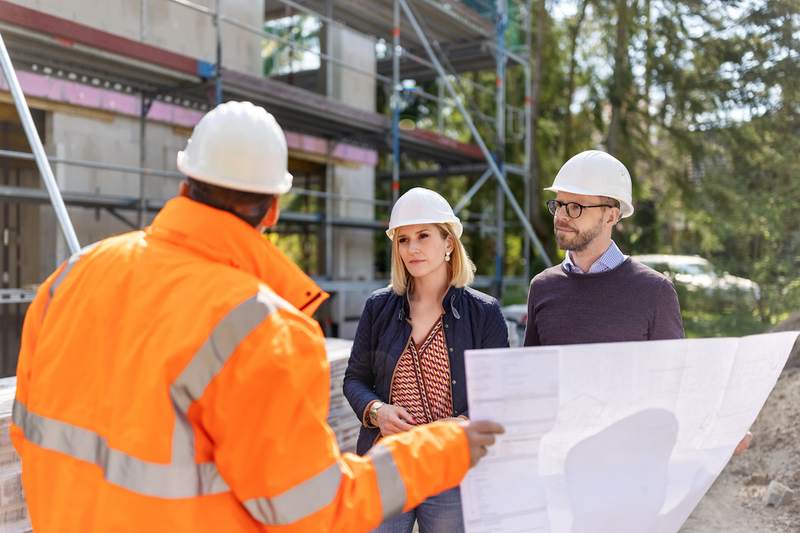
Having good credit will help you get a mortgage. It also helps you snag a lower interest rate, which saves you money in both the short and the long term.
If you don’t have much credit, then you might decide to hold off on buying a home until your credit score improves and you have more home loan options. You can build credit by making responsible financial decisions over time.
Here are some steps you can take to build good credit and buy a house.
1. Pay Bills on Time
Your payment history is a major factor in calculating your credit score. It accounts for 35% of your FICO score, so make sure you pay bills in full and on time. Good credit shows lenders you are reliable about paying back debts, and indicates that you pose less risk as a borrower.
2. Pay Down Your Balances
Reducing your overall debt load also helps you build good credit. Your credit score is contingent on your credit utilization ratio, which represents how much of your available credit you’re using.
To calculate your credit utilization ratio, add your debt balances and then divide by the sum of your credit limits. A low ratio shows that you’re paying down what you owe, while a high ratio suggests you’re having a hard time keeping up with your debts.
3. Keep Low Balances
Another way to keep your credit utilization ratio low is by keeping low balances. If you aren’t putting too much on a credit card, then it’s easier to keep up with the monthly payment. Maintaining low balances and paying off your credit cards each month helps you build good credit.
4. Keep Your Accounts Open
If you aren’t using some of your credit cards, keep those accounts open. When you have a lot of credit available that you aren’t using, it helps your credit score. Plus, having a longer credit history boosts your score.
At the same time, if the card has an annual fee that you can’t justify paying, then you may want to close that account.
5. Pay Off Delinquent Accounts
If you have bills or accounts that are past due, prioritize paying them as soon as possible. Paying bills late isn’t good for your credit. The longer you wait to pay late bills, the more damage it does to your credit score.
6. Get a Secured Credit Card
A secured credit card is similar to a regular credit card, except you have to pay a refundable security deposit when open the account. This deposit usually equals your credit limit and reduces the lender’s risk of you defaulting. If you use a secured credit card responsibly, it will help you build good credit.
7. Get a Credit-Builder Loan
A credit-builder loan is designed to help borrowers build credit. It’s like a savings account, except you make payments each month and get the money once you’ve paid the total loan amount. However, you also will be paying interest and fees.
If you think a credit-builder loan might be a good fit for you, you should first assess whether there’s room in your budget for the monthly payment.
8. Find a Co-Signer
Getting someone with good credit to co-sign your loan application can help you overcome having little or no credit yourself. Then, you can build credit when you make your mortgage payment each month.
Just keep in mind that a co-signer is accepting a shared legal responsibility for the repayment of your loan. If you fall behind on payments, it will hurt your credit, as well as theirs.
9. Request a Rapid Rescore
A rapid rescore can improve your credit score if it includes recent payment information that wasn’t previously included in your credit report. It typically takes a full billing cycle or two for creditors to report payment information to credit reporting agencies. A lender can pay a fee to a credit reporting company to have your report updated to include your most recent activity.
10. Avoid New Debt
It’s hard enough to pay down debt. Adding new debt steers you in the wrong direction. Of course, you can’t control certain necessary or unexpected expenses in life. Just make sure you don’t begin spending outside of your means because you have lines of credit available to you.
11. Monitor Your Credit Report
Keeping an eye on your credit report can help you avoid dings for inaccuracies. It also can help you track how your spending affects your credit.
You can access a free copy of your credit report from each of the major credit bureaus every year through annualcreditreport.com. Review your report carefully and dispute any inaccurate information.
The Bottom Line: Building Good Credit Takes Time
Credit scores don’t change dramatically overnight. Think of your score as more of a summary of your financial behavior over time. If you are patient and commit to making responsible spending decisions and paying down your debts, you can build good credit that will help you get a mortgage and save money.











